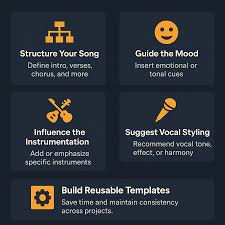Introduction: Why Use AI to Create Metal Music?
Creating metal music has traditionally been an intense, complex process—requiring not just raw musical talent, but also expensive gear, hours of mixing, and deep genre knowledge. However, the landscape is changing rapidly. With the rise of advanced AI tools, it’s now possible to create metal music with AI—without ever picking up a guitar or programming a double kick drum manually.
This isn’t just a gimmick. AI is revolutionizing how producers, solo artists, and even full bands approach heavy music. Whether you're crafting death metal, metalcore, djent, or symphonic metal, AI tools can now generate realistic riffs, brutal drum patterns, and growling vocals, and even mix and master your tracks.
In this post, we’ll walk you through the how and why of creating metal music with AI, showcase the best tools available, and provide step-by-step methods to help you start producing your own AI-powered heavy tracks today.

Why Create Metal Music with AI in the First Place?
Metal is a genre that thrives on precision, speed, and texture. This makes it a perfect match for AI tools that specialize in audio processing, music theory modeling, and automated sound synthesis.
Here are some compelling reasons to use AI for metal music:
Fast Composition: AI can generate complex riffs, time signatures, and breakdowns within seconds.
Accessibility: No need for high-end amps, mics, or multi-instrument skills.
Endless Inspiration: Use AI to spark ideas for melodies, drum fills, and vocal phrasing when you hit creative blocks.
Solo Creators Welcome: You don’t need a full band—AI can simulate guitar, bass, drums, and vocals.
Cost Efficiency: Avoid studio fees and expensive plug-ins with all-in-one AI music platforms.
In other words, if you're an indie artist, bedroom producer, or someone curious about fusing tech with metal, AI is your new mosh-pit partner.
Best AI Tools to Create Metal Music (Tested and Trusted)
To successfully create metal music with AI, you’ll want a combination of tools—some for instrument generation, some for vocal synthesis, and others for production polish.
Here are the most effective AI tools for heavy music:
Suno AI
Great for generating full songs in various genres, including metal.
You can describe a prompt like “technical death metal with growls and blast beats,” and it will generate a coherent track.
No DAW experience required.
Output includes WAV files and lyrics.
Udio
Another full-song AI generator with a cleaner UI than Suno.
Capable of melodic metalcore, symphonic metal, and djent when prompted properly.
Vocals are more polished, and it allows section-by-section customization.
Riffusion
AI model specifically trained to generate guitar riffs.
Great for producing loopable metal riffs and short motifs.
You can export stems to your DAW and arrange them manually.
Orb Producer Suite by Hexachords
AI-powered MIDI generator.
Perfect for creating intricate basslines, rhythm guitar progressions, or drum patterns in genres like doom, prog, and thrash.
Emvoice One & Synthesizer V
AI vocal synths that can perform metal growls and harmonized screams with the right phonetics.
Ideal for creating AI vocals or layering synthetic voices over real screams.
LANDR & RoEx Mastering
Use these AI mastering tools to give your metal tracks the final punch they need.
Great for tightening up the low-end and balancing out distortion-heavy mixes.
How to Create Metal Music with AI: Step-by-Step Breakdown
Here’s a practical workflow to help you go from concept to a finished AI-generated metal track:
Step 1: Define Your Genre and Substyle
Decide whether you're aiming for death metal, black metal, metalcore, or groove metal. This helps with AI prompting.
Step 2: Generate Instrumental Sections
Use Suno AI or Riffusion to create riffs, drum lines, and bass. Try prompts like:
“melodic death metal riff at 180 bpm with palm-muted chugs and blast beats”
“progressive djent groove in 7/8 time with synth layer”
Step 3: Build Arrangement in DAW (Optional)
Import generated loops or full stems into your Digital Audio Workstation (like Reaper or Ableton Live) to rearrange, edit, or layer custom parts.
Step 4: Add Vocals with AI Synths
If you don’t want to record your own voice, use Emvoice One or Synthesizer V to simulate harsh vocals. Adjust phonemes and filters to add grit and aggression.
Step 5: Mix and Master with AI
Once your track is ready, send it to LANDR for AI-driven mastering or use Izotope Ozone for smart EQ, compression, and stereo widening.
Real Results: Can You Actually Get “Good” Metal from AI?
Yes—and Reddit proves it.
On subreddits like r/SunoAI and r/ArtificialMusic, users have shared complete AI metal tracks that rival some mid-tier releases on Bandcamp. Many blend AI-generated instrumentals with real vocals or rework sections in a DAW for added control.
Success stories include:
A full symphonic black metal track made in Suno that landed on Spotify editorial playlists.
Djent instrumental EPs created entirely with Riffusion + LANDR.
Vocal covers produced using Synthesizer V for AI screams layered over AI drums and guitars.
Tips to Improve AI-Generated Metal Tracks
Always use specific, genre-rich prompts: e.g., “Swedish death metal with twin guitar harmonies and tremolo picking.”
Don’t be afraid to edit manually—AI isn’t perfect, so touching up drum timing or EQing guitars makes a difference.
Layer real instruments or samples for realism, especially guitar solos or ambient intros.
Combine tools: Use Riffusion for riffs, Emvoice for vocals, and LANDR for mastering for a full AI chain.
Conclusion: Why You Should Start Making Metal Music with AI Today
Creating metal music with AI isn’t just a novelty—it’s becoming a legitimate way to produce heavy, layered, and intense music, especially for indie creators without access to a full band or studio setup. Whether you're experimenting, releasing demos, or even building an AI-human hybrid band, the tools exist now to turn your riffs and roars into real, listenable songs.
Start small, experiment often, and let AI handle the heavy lifting—literally.
FAQs: AI Metal Music Creation
Q1: Can AI generate realistic metal guitar riffs?
Yes. Tools like Riffusion and Suno can produce loopable, genre-accurate riffs that can be used directly or refined further.
Q2: Is it legal to publish AI-generated metal songs?
Generally yes—if you own the rights to the input or are using royalty-free tools. Platforms like Suno offer licenses for commercial use.
Q3: Can AI replicate metal vocals?
Not perfectly, but tools like Synthesizer V and Emvoice can simulate growls and screams convincingly with careful tuning.
Q4: Do I need to know music theory to use these tools?
Not at all. Most AI generators require only descriptive text prompts, not technical musical knowledge.
Q5: Is this suitable for professional use?
Yes, especially for demoing ideas, background scores, content creation, or even full commercial releases when paired with solid post-production.
Learn more about AI MUSIC








